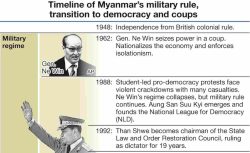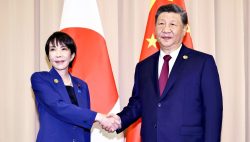16:58 JST, May 4, 2024
It is significant to address the international community on the dangers of generative artificial intelligence, but if Japan prioritizes the development of AI at home, it may lack convincing explanations.
First, it is necessary to strengthen laws and regulations on AI domestically.
At a recent ministerial council meeting of the Organization for Economic Cooperation and Development in Paris, an agreement was made to create a new international framework to balance the regulation and utilization of AI. The initiative was presented by Prime Minister Fumio Kishida, and the framework comprises about 50 countries and a region, mainly OECD member states.
The Group of Seven industrialized nations already compiled international rules on generative AI at the end of last year.
The G7 rules require AI developers to evaluate risks, such as whether the technology may facilitate criminal misuse, prior to its deployment on the market. The group also proposed the introduction of digital watermarking and other techniques to enable users to identify whether an image was generated by AI.
The OECD’s agreement to create a new framework this time is aimed at sharing the rules compiled by the G7 with more countries.
Europe has become increasingly vigilant against AI-generated disinformation and videos, as they could disrupt elections. In Japan, false advertisements in which celebrities solicit investments have flooded social media, resulting in a growing number of fraud cases.
It can be said that facing up to the adverse aspects of AI and eliminating its risks is a challenge that should be taken up by the international community as a whole.
The government has taken the initiative in creating the framework this time and gained the support of the participating states. Domestically, however, it has not stepped up work on revising the Copyright Law and has remained reluctant to regulate AI. The government has stopped at calls for self-regulation by the industry. It has been more proactive in using the technology.
In 2018, Japan amended the Copyright Law to allow AI to learn texts and illustrations without the permission of the copyright holders.
If this situation is left unaddressed, artists and creators will lose their motivation to devote themselves to producing their works. How does the government view the importance of intellectual property, including copyrighted works?
In his speech at the OECD meeting, Kishida announced his intention to support the development of technology to identify the authenticity of online information.
What he had in mind was Originator Profile, which is currently being studied by media organizations and others. The envisaged technology will have a third-party organization guarantee the reliability of information and display an onscreen certification.
It is important to support the development of such technology, but AI risks cannot be reduced by this measure alone. By learning from the example of Europe, which is making progress on AI legislation, Japan should consider moves including another amendment of the Copyright Law.
(From The Yomiuri Shimbun, May 4, 2024)
Top Articles in Editorial & Columns
-

Myanmar Will Continue Under Military Rule Even After Election, Ex-Ambassador Maruyama Says in Exclusive Interview
-

40 Million Foreign Visitors to Japan: Urgent Measures Should Be Implemented to Tackle Overtourism
-

Expansion of New NISA: Devise Ways to Build up Household Assets
-

China Criticizes Sanae Takaichi, but China Itself Is to Blame for Worsening Relations with Japan
-

Withdrawal from International Organizations: U.S. Makes High-handed Move that Undermines Multilateral Cooperation
JN ACCESS RANKING
-

Univ. in Japan, Tokyo-Based Startup to Develop Satellite for Disaster Prevention Measures, Bears
-

JAL, ANA Cancel Flights During 3-day Holiday Weekend due to Blizzard
-

China Confirmed to Be Operating Drilling Vessel Near Japan-China Median Line
-

China Eyes Rare Earth Foothold in Malaysia to Maintain Dominance, Counter Japan, U.S.
-

Japan Institute to Use Domestic Commercial Optical Lattice Clock to Set Japan Standard Time



















